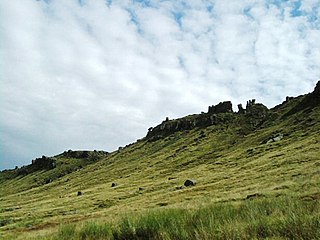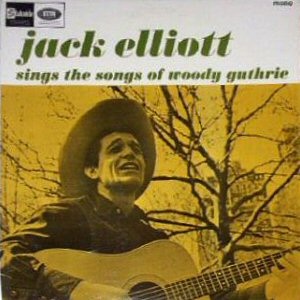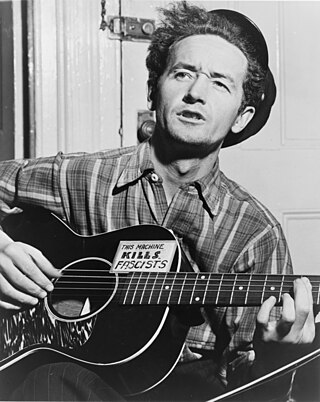Related Research Articles

Woodrow Wilson Guthrie was an American singer-songwriter and composer who was one of the most significant figures in American folk music. His work focused on themes of American socialism and anti-fascism. He inspired several generations both politically and musically with songs such as "This Land Is Your Land".

The Dust Bowl was the result of a period of severe dust storms that greatly damaged the ecology and agriculture of the American and Canadian prairies during the 1930s. The phenomenon was caused by a combination of natural factors and human-made factors: a failure to apply dryland farming methods to prevent wind erosion, most notably the destruction of the natural topsoil by settlers in the region. The drought came in three waves: 1934, 1936, and 1939–1940, but some regions of the High Plains experienced drought conditions for as long as eight years. It exacerbated an already existing agricultural recession.

Bound for Glory is a 1976 American biographical film directed by Hal Ashby and loosely adapted by Robert Getchell from Woody Guthrie's 1943 partly fictionalized autobiography Bound for Glory. The film stars David Carradine as folk singer Woody Guthrie, with Ronny Cox, Melinda Dillon, Gail Strickland, John Lehne, Ji-Tu Cumbuka and Randy Quaid. Much of the film is based on Guthrie's attempt to humanize the desperate Okie Dust Bowl refugees in California during the Great Depression.

"This Land Is Your Land" is a song by American folk singer Woody Guthrie. One of the United States' most famous folk songs, its lyrics were written in 1940 in critical response to Irving Berlin's "God Bless America". Its melody is based on a Carter Family tune called "When the World's on Fire". When Guthrie was tired of hearing Kate Smith sing "God Bless America" on the radio in the late 1930s, he sarcastically called his song "God Blessed America for Me" before renaming it "This Land Is Your Land".

The mass trespass of Kinder Scout was a trespass protest at Kinder Scout in the Peak District, Derbyshire, England, on 24 April 1932. The protest sought to highlight that walkers were denied access to areas of open countryside which had been fenced off by wealthy landowners who forbade public access. It was organised by communist leader and Jewish anti-fascist Benny Rothman, the secretary of the British Workers' Sports Federation and a member of the Young Communist League.

Pyecombe is a village and civil parish in the Mid Sussex District of West Sussex, England. Pyecombe is located 7 miles (11 km) to the north of Brighton. The civil parish covers an area of 887 hectares and has a population of 200, increasing at the 2011 Census to a population of 237.

Dust Bowl Ballads is an album by American folk singer Woody Guthrie. It was released by Victor Records, in 1940. All the songs on the album deal with the Dust Bowl and its effects on the country and its people. It is considered to be one of the first concept albums. It was Guthrie's first commercial recording and the most successful album of his career.
Marjorie Guthrie, who used Marjorie Mazia as her professional name, was a dancer, dance teacher, and health science activist. She was married to folk musician Woody Guthrie. Her children with him include folk musician Arlo Guthrie and Woody Guthrie Publications president Nora Guthrie.

American singer-songwriter Woody Guthrie's published recordings are culled from a series of recording sessions in the 1940s and 1950s. At the time they were recorded they were not set down for a particular album, so are found over several albums not necessarily in chronological order. The more detailed section on recording sessions lists the song by recording date.
George Herbert Bridges Ward, known as G. H. B. Ward or Bert Ward was an activist for walkers' rights and a Labour Party politician.

Black Sunday is a particularly severe dust storm that occurred on April 14, 1935, as part of the Dust Bowl in the United States. It was one of the worst dust storms in American history and caused immense economic and agricultural damage. It is estimated that 300 thousand tons of topsoil were displaced from the prairie area.
The Ramblers Association, branded simply as the Ramblers, is Great Britain's walking charity. The Ramblers is also a membership organisation with around 100,000 members and a network of volunteers who maintain and protect the path network. The organisation was founded in 1935 and campaigns to keep the British countryside open to all.

Jack Elliott Sings the Songs of Woody Guthrie is an album by American folk musician Ramblin' Jack Elliott, released in September 1960. It consists of songs written or well known as performed by Woody Guthrie.

Thinking of Woody Guthrie was released in 1969 by Vanguard Records and is the debut solo album of Country Joe McDonald, best known for his work with Country Joe & the Fish. It was a different approach by McDonald to release a folk music and country album in the style of Woody Guthrie. Prior to this solo release, he was known to make albums in a psychedelic style with his band. The album was a tribute to the work of Woody Guthrie, a country and folk musician who died two years earlier. All of the tracks on the album were either composed or performed by Guthrie. McDonald was heavily influenced by Guthrie since he was a child. McDonald could recall his interest of Guthrie came first when his parents played Guthrie's first album, Dust Bowl Ballads. Even though McDonald has issued several albums in his career, he looks to this album as the piece he is most proud of.

Woody At 100: The Woody Guthrie Centennial Collectionis a 150-page large-format book with three CDs containing 57 tracks, including Woody Guthrie's most important recordings such as the complete version of "This Land Is Your Land," "Pretty Boy Floyd," "I Ain't Got No Home in This World Anymore," and "Riding in My Car." The set also contains 21 previously unreleased performances and six never-before-heard original songs, including Woody's first known—and recently discovered—recordings. It is an in-depth commemorative collection of songs, photos and essays released by Smithsonian Folkways in June 2012.
"Ain't Got No Home" is a song by Woody Guthrie, released on Dust Bowl Ballads in 1940, in which the singer laments the difficulties that life presents him. It was based on a gospel song Guthrie heard on his visits to the migrant camps known variously as "Can't Feel at Home" or "I Don't Feel at Home in This World Anymore", which had been made popular by the Carter Family in 1931.

"So Long, It's Been Good to Know Yuh" is a song by American folk musician Woody Guthrie released as part of his album Dust Bowl Ballads. The composition is considered one of Guthrie's best songs, defining his style, and demonstrating his "increasing comfort with writing topical songs about the poor and downtrodden". It has been categorized as a "Dust Bowl ballad" by music critics. The song was also included in the Library of Congress Recordings from 1940 made by Guthrie and Alan Lomax.

Bound for Glory is a 1956 album by Woody Guthrie and Will Geer. It consists of a selection of songs from Guthrie's Dust Bowl Ballads of 1940 and his Asch recordings of 1944–45, each introduced briefly by Geer with spoken relevant extracts from Guthrie's writings.

David Bangs is a field naturalist, social historian, public artist, author and conservationist. He has written extensively on the countryside management, both historically and present day in the English county of Sussex.
Guy Shrubsole is a British researcher, writer and campaigner. He wrote Who Owns England? (2019), The Lost Rainforests of Britain (2022), and, most recently, The Lie of the Land (2024).
References
- ↑ "Old Abingdonians" (PDF). Abingdon School. Retrieved 18 June 2024.
- 1 2 3 "Forgive us our trespasses: forbidden rambles with a right-to-roam campaigner". The Guardian. 9 August 2020. Retrieved 7 April 2021.
- ↑ "Bradley Garrett - This Land is Your Land". Literary Review. Retrieved 7 April 2021.
- ↑ "Rime of the Modern Mariner" (PDF). Abingdon School. Retrieved 18 June 2024.
- ↑ "The Times: Right To Roam". The History of England. Retrieved 18 June 2024.
- ↑ "Nick Hayes". Penguin Random House. Retrieved 7 April 2021.
- ↑ "Keep On Roaming - Ramblers". www.ramblers.org.uk. Retrieved 7 April 2021.
- ↑ "Hundreds attend mass trespass for the right to roam". The Argus. 26 July 2021. Retrieved 26 July 2021.
- ↑ "How the trespass movement is battling for a kinder, more inclusive Britain". www.newstatesman.com. 29 July 2021. Retrieved 30 July 2021.
- ↑ "The Rime of the Modern Mariner by Nick Hayes – review". The Guardian. 2 April 2011. Retrieved 7 April 2021.
- ↑ Smart, James (29 November 2014). "Woody Guthrie and the Dust Bowl Ballads review – a passionate picture of the folk singer and his times". The Guardian. ISSN 0261-3077 . Retrieved 7 April 2021.
- ↑ "Woody Guthrie's Dust Bowl Ballads Actually Make Pretty Good Comics". www.vice.com. 7 September 2016. Retrieved 7 April 2021.
- ↑ Kois, Dan (10 March 2016). "Read This Beautiful, Stirring Cartoon Portrait of Woody Guthrie". Slate Magazine. Retrieved 7 April 2021.
- ↑ "Cormorance by Nick Hayes review – the healing power of nature". The Guardian. 4 November 2016. Retrieved 7 April 2021.
- ↑ McLaughlin, Aimée (11 October 2016). "Cormorance, by Nick Hayes". Design Week . Retrieved 7 April 2021.
- ↑ "The Drunken Sailor by Nick Hayes review – intense beauty". The Guardian. 30 April 2018. Retrieved 7 April 2021.
- ↑ "The Book of Trespass by Nick Hayes review – a trespasser's radical manifesto". The Guardian. 10 August 2020. Retrieved 7 April 2021.
- ↑ "The Book of Trespass by Nick Hayes book review". The Times Literary Supplement. Retrieved 7 April 2021.
- ↑ "Book of the Week: The Book of Trespass". Idler. Retrieved 7 April 2021.
- ↑ "The Book of Trespass is a gorgeously written and merrily provocative tour of English landscapes". inews.co.uk. 25 August 2020. Retrieved 7 April 2021.